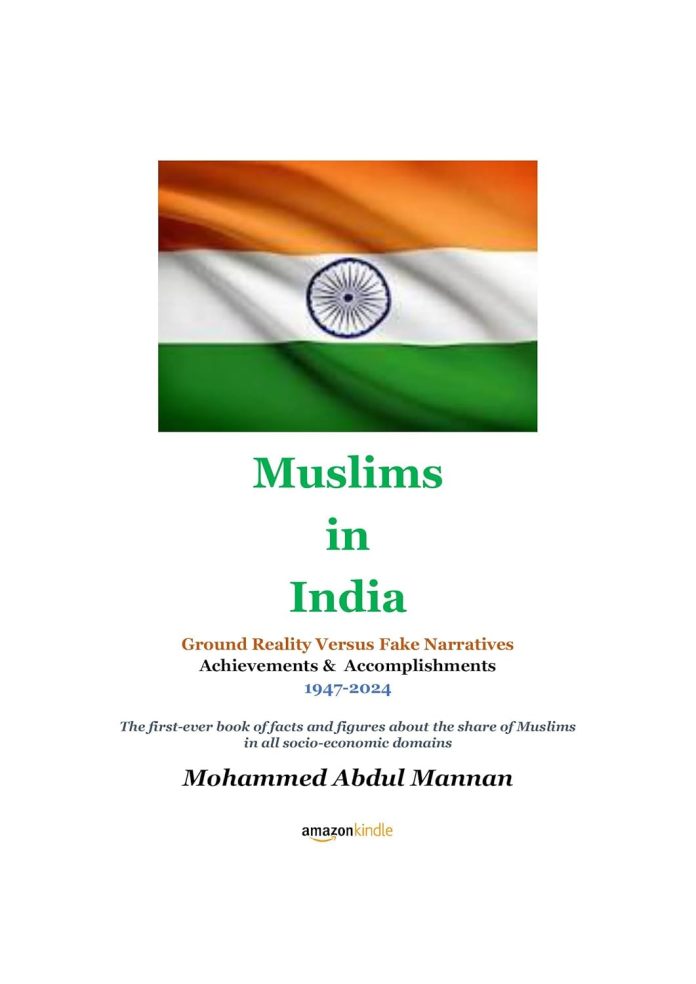– A recently published book, Muslims in India: Ground Reality Versus Fake Narratives – Achievements & Accomplishments 1947-2024, by Hyderabad-based journalist-writer Mohammed Abdul Mannan, sheds light on the stark underrepresentation of Muslims in India’s government and administrative structures. Based on exhaustive research, the book reveals that out of 11,131 officials across 54 Union Ministries and 93 Departments in New Delhi, only 178 are Muslims.
The book claims this is the lowest-ever recorded representation of Muslims in India’s Union government, a notable figure for a community that constitutes 14.2% of India’s population, according to the 2011 Census. It also highlights systemic discrimination, with the community battling an overt agenda of marginalisation since 2014. Since July 2022, the Union Cabinet has had no Muslim representatives – a historical first.
The study provides detailed data on Muslim officials across various ministries, reflecting minimal representation:
- Prime Minister’s Office (PMO): No Muslim officials among 52 staff members since its inception in 1977.
- Agriculture and Farmers Welfare Ministry: Five Muslims among 710 officials, including one Under Secretary and two Additional Secretaries.
- External Affairs Ministry: Only one Muslim (a Regional Passport Officer) among 115 officials.
- Home Affairs Ministry: Four Muslims, including a Deputy Director General, among 345 officials.
- Education Ministry: Five Muslims among 207 staff, with one Under Secretary.
- Health and Family Welfare Ministry: One Muslim Joint Secretary among 89 officials.
The book extends its analysis to state and police services, highlighting similarly low representation across BIMARU states (Bihar, Madhya Pradesh, Rajasthan, and Uttar Pradesh):
- Bihar: Three Muslim SPs/ASPs out of 59, and 33 Muslim officers among 369 in the State Police Service.
- Uttar Pradesh: Six Muslim SPs/ASPs among 305, and 15 Muslim officials among 1057 in the State Administrative Service.
- Madhya Pradesh: One Muslim SP/ASP out of 139, and seven among 886 in the State Police Service.
- Rajasthan: Five Muslim SPs/ASPs out of 248, and 88 Muslims among 2726 Inspectors/Sub-Inspectors.
Across India, only 151 Muslims hold IPS positions out of 4344 officials, and the total number of Muslim officers in various police and administrative services remains disproportionately low.
The book also highlights the community’s limited presence in other domains:
- Legislative Assemblies: Muslim voters are influential in 450 constituencies, but only 3198 Muslim MLAs have served out of 60,693 total seats.
- Parliament: A total of 527 Muslim MPs have served in the Lok Sabha out of 9430 members in history, while the Rajya Sabha saw 329 Muslims out of 2176 members.
- Higher Education: 62 Muslims served as Vice Chancellors in 1017 Central Universities, and 219 in 8633 State Universities.
The book underscores the deep-rooted disparities faced by India’s 200-million-strong Muslim community, particularly in governance, education, law enforcement, and politics. Despite being the world’s third-largest Muslim population, their representation in key sectors remains alarmingly low.
This meticulous research by Mohammed Abdul Mannan highlights the urgent need for systemic reforms to ensure greater inclusivity and equity for all communities in India.




